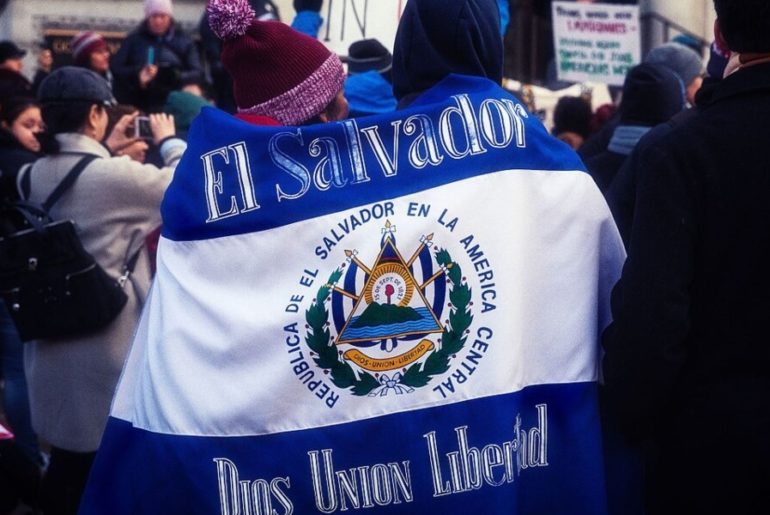On October 28, 2019, the United States and El Salvador reached an agreement to extend for one more year the validity of work permits for El Salvadorans with Temporary Protected Status (TPS) currently residing in the U.S. How does this impact Salvadoran immigrants living in the U.S. today and tomorrow?
According to the U.S. Citizenship and Immigration Services, “The Secretary of Homeland Security may designate a foreign country for TPS due to conditions in the country that temporarily prevent the country’s nationals from returning safely, or in certain circumstances, where the country is unable to handle the return of its nationals adequately.” This program allows approximately 250,000 Salvadorans who currently have TPS to stay in the U.S. without being deported and extends the validity of their work permits for 365 days.
On October 28, The Department of Homeland Security (DHS) announced that the two countries had signed a number of documents to implement greater collaboration on information sharing, border and aviation security, and international diplomacy, and announced an extended timeline for El Salvadorans with Temporary Protected Status (TPS) to repatriate to El Salvador.
“Today’s agreements will significantly help the U.S. and our partners in El Salvador confront illegal migration and will strengthen the entire region as we approach the implementation of asylum cooperative agreements,” said Acting Secretary McAleenan.
“The Salvadorans protected by the TPS are admirable people, who have worked for 20 years to build a future of well-being. Now, thanks to President Bukele, we can tell nearly 250,000 fellow citizens and their families that with the support of the United States they can continue to fight for their dreams. They are not alone. We will continue to work 24/7 for a permanent solution,” said El Salvador Foreign Minister Alexandra Hill.
The DHS joint agreements with El Salvador are:
– Border Security Arrangement, the U.S. will deploy officials from U.S. Customs and Border Protection and U.S. Immigration and Customs Enforcement to advise and mentor their El Salvadoran counterparts to further enhance their current operation and share best practices.
– Biometrics Data Sharing Program Arrangement, DHS and El Salvador will enhance cooperation to prevent and combat crime through the expansion of biometric data collection and information sharing.
– The Trump Administration is extending the validity of work permits for El Salvadorans with Temporary Protected Status (TPS) through January 4, 2021. Additionally, they are providing El Salvadorans with TPS an additional 365 days after the conclusion of the TPS-related lawsuits to repatriate back to their home country.
On Monday morning (October 28, 2019), the President of El Salvador published a video on Twitter in which he said, “They said it was impossible. That the Salvadoran Government could not do anything. But we knew that our allies would not leave us alone. We didn’t want to share it earlier because we could hinder the conversations. But after all, thank God, the TPS was achieved.”
In this video, the ambassador to El Salvador, Ronald D. Johnson said, “we are very happy to announce that today in Washington, D.C. we signed an agreement that extends the TPS for Salvadorans who are in the U.S. for another year.”
Hours later, USCIS Acting Director, Ken Cuccinelli, made a clarification on this agreement, he said on Twitter that it is not an extension of the TPS but an extension of the work permits of Salvadorans benefiting from protection: “A clarification some reporting has spoken of “extending TPS.” That has an important legal meaning, and that’s not what happened w/ the agreements. Rather, work permits for Salvadorans will be extended for 1 year past resolution of litigation for an orderly wind down period.”
According to the Congressional Research Service report, TPS beneficiaries from El Salvador total 251,526 people. Since late 2017, TPS for Salvadorans has gone through a period of uncertainty. As reported in a Revolution English article, while TPS was established and originally granted to Salvadorans in 1990, the most recent iterations of TPS for El Salvadorans were in 2001, following several earthquakes in the country. TPS was granted or extended by the George W. Bush and Obama administrations until the Trump administration announced plans to terminate TPS for Salvadorans in late 2017. On January 8, 2018, DHS announced the decision to terminate TPS for Salvadorans entirely. On October 3, 2018, Judge Edward Chen of the Northern District of California intervened and rescinded Trump’s termination of TPS for Sudan, Nicaragua, Haiti, and El Salvador, saying, “Absent injunctive relief, TPS beneficiaries, and their children indisputably will suffer irreparable harm and great hardship… Many have U.S.-born children; those may be faced with the Hobson’s choice of bringing their children with them (and tearing them away from the only country and community they have known) or splitting their families apart.”
While the intervention of Judge Chen gave a sense of relief to immigrants from El Salvador and elsewhere, there is still a lot of misinformation and lack of awareness of the process and the legal mechanisms involved. And while on the surface, the new agreement between the U.S. and El Salvador extends the ability for TPS Salvadoran immigrants to work legally in the country, it is not clear what will happen when the agreement expires. A permanent solution for these people, many of whom have lived in this country for decades, has not been proposed. Further, with the explicit clarification from USCIS Acting Director, Ken Cuccinelli that TPS has not been extended, it is reasonable to guess that the administration has no intention to renew or otherwise extend TPS for Salvadorans. Mr. Cuccinelli was explicit that their action on work permits was only meant to provide “an orderly wind down period” while ongoing litigation was in process. While we are grateful that Salvadorans have some temporary relief, and a modicum of stability at this moment, we hope that the continued humanitarian intervention of the courts will be sustained.

